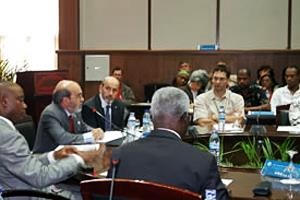New food and nutrition security strategy for lusophone countries
20 July 2012, Maputo - Portuguese-speaking countries have found the right approach to tackling the hunger problem - by a combined effort of governments, civil society and the private sector, FAO Director-General José Graziano da Silva told the Conference of Heads of State and Government of the Community of Portuguese-speaking Countries (CPLP) today.
Graziano da Silva praised the bloc's adoption of the Regional CPLP Strategy for Food and Nutrition Security and the creation of a Food Security and Nutrition Council, calling them "important institutional frameworks to achieve the goal of a world without hunger."
"I am convinced that the strategy created by you will contribute to the strengthening of national and regional food and nutrition security plans and could become an example for other countries and regional organizations," Graziano da Silva said.
"The establishment of a council that includes representatives from civil society and the private sector gives further legitimacy and support to the government-led efforts to fight hunger and promote food security," he added.
The FAO chief also told African countries that the fight against hunger requires greater commitment among African countries.
He referred to the creation of an African Fund for Food Security endorsed by the FAO Regional Conference for Africa in April, to be financed by Africans, for Africans.
"This is a proposal that will allow African countries in better economic and financial conditions to support their neighbors in implementing regional food security programs, thus preventing the impact of food insecurity crises – resulting from droughts, for example – from spreading throughout the region in the form of uncontrolled migration, which could eventually destabilize all countries in that area," Graziano da Silva said.
FAO currently carries out projects in CPLP countries totaling around $200 million. "This seems a significant amount, but it represents less than a dollar for each person of the CPLP. We can do much more with the support of the community."
The community of Portuguese-speaking (lusophone) countries is composed of Angola, Brazil, Cape Verde, Guinea-Bissau, Mocambique, Portugal, São Tomé and Príncipe, and Timor-Leste, with a combined population of more than 240 million people.
